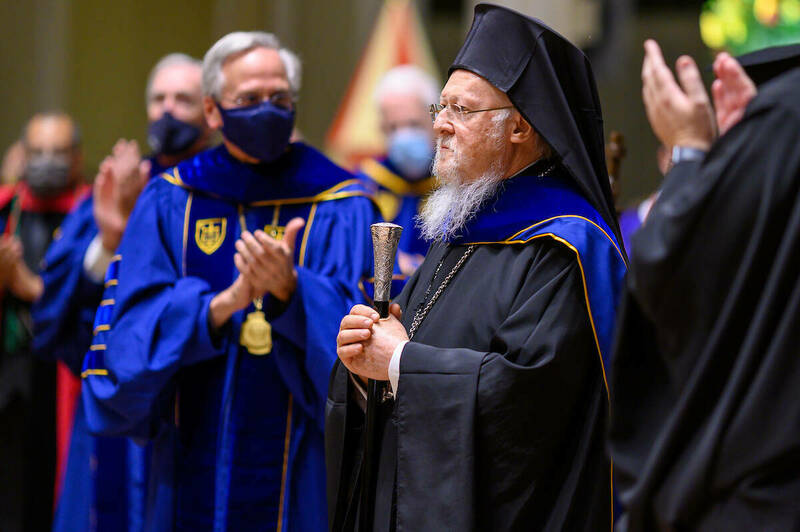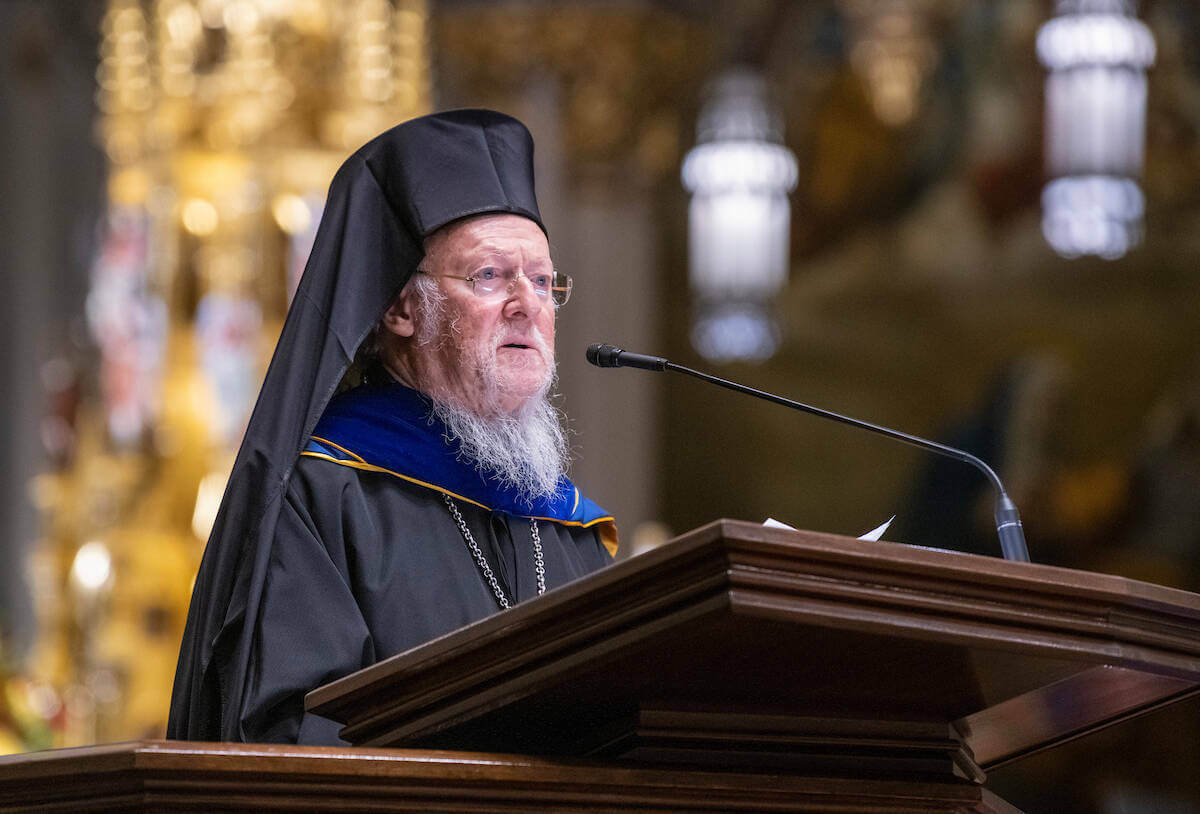 His All-Holiness Bartholomew, Orthodox Archbishop of Constantinople-New Rome and Ecumenical Patriarch, after receiving an honorary degree from Notre Dame. Photo by Matt Cashore ’94
His All-Holiness Bartholomew, Orthodox Archbishop of Constantinople-New Rome and Ecumenical Patriarch, after receiving an honorary degree from Notre Dame. Photo by Matt Cashore ’94
The successor of St. Andrew the Apostle is now an alumnus of the University of Notre Dame.
During an extraordinary academic convocation held at the Basilica of the Sacred Heart on October 28, His All-Holiness Bartholomew, the archbishop of Constantinople-New Rome, received an honorary doctor of laws degree conferred by Rev. John I. Jenkins, CSC, ’76, ’78M.A., the University’s president, and Jack Brennan, chair of the board of trustees.
As ecumenical patriarch since 1991, the “first among equals” of the patriarchs of Eastern Orthodoxy, Bartholomew has made ecumenism, interreligious dialogue, religious freedom and climate change hallmarks of his preaching and spiritual leadership of nearly 300 million Orthodox Christians worldwide. Pope Francis, in his celebrated 2015 eco-encyclical, Laudato si’, acknowledged how the “Green Patriarch” for decades had been calling attention to “the ethical and spiritual roots of environmental problems, which require that we look for solutions not only in technology, but in the change of humanity.”
Two years earlier, Bartholomew became the first ecumenical patriarch since the Great Schism of 1054, which severed ties between the Western and Eastern churches, to attend the inauguration of a pope. In his address to the convocation, Jenkins called Bartholomew’s trip to Rome in honor of Francis an “act of love and courage to help heal the wounds of a thousand years.”
The ecumenical patriarch, unable to deliver the commencement address to Notre Dame’s Class of 2020 because of the coronavirus pandemic, focused his remarks at the basilica on Christian duty in response to the twin crises of climate change, “the foremost challenge of our time,” and COVID-19.
Here’s some of what he had to say:
This convocation occurs in the context of yet another global challenge. Both climate change and the coronavirus pandemic are rightly labeled as crises. You may be aware that the etymological root of the word “crisis” is a Greek word that signifies “judgment.” The truth is that we are all judged by our response to or rejection of defining moments in our lives. Ironically, the strategies used to dismiss climate change and COVID-19 adhere to a similar pattern and are adopted by the same people.
Throughout the world, we witnessed how the pandemic revealed the best in human nature, as well as the worst in human indifference.
This is precisely where the role of the Church becomes paramount. Because a Christian should always remember the vertical dimension alongside — and never at the expense of — the horizontal dimension of the social gospel. It is of course always difficult to maintain a delicate balance between these two dimensions, but that is the message of the Cross, which marks the tension and intersection between the earthly and the heavenly.

Religion must function and serve in connection with — and never in isolation from — science. Faith alone will not overcome the problems of our time; but the challenges of our time will certainly not be overcome without faith. Research and medicine are gifts from God; they supply answers to the question, “How?” Faith and theology are also gifts from God; they provide responses to the question, “Why?”
How can the kingdom of heaven be reflected in the reality of earth? What does Liturgy look like when it is extended to the service of the world? In the 7th century, St. Maximus the Confessor spoke of a “cosmic liturgy.” This broader worldview is what enables us to imagine a world that is different to the one we have created or become accustomed to.
What we are facing cannot naively be dismissed as a temptation or a trial. It is not some kind of punishment from God or threat from government. And it is certainly not a result of “sin” or a revelation of the “end.”
Our response to COVID-19 is the very arena where all Christian believers — and, indeed, all people of good will — are called to be and struggle. Otherwise, the truth is that we are not living up to our vocation as preachers of Christ crucified and disciples of our Lord, who was buried and arose on the third day.
We are all called to make connections between hurting people and hurting the earth. When some 25 years ago we defined abusing the natural environment as sin . . . we were pleading for people to revise their conception of what is right and what is wrong.
This is why we applaud efforts to expand relevant statutes of international law to include “ecocide,” defined as the unlimited and unlawful destruction of ecosystems through oil drilling and spills, industrial fishing and livestock farming, plastic pollution and mountaintop removal, but also nuclear weapons and testing. In the same framework, we also welcome the discussion in the Latin Code of Canon Law to include a provision calling every believer not only to avoid damaging creation as our common home, but to enhance the natural environment.
On this journey, it is you — college students — that offer us the optimism that we so yearn for: The readiness to accept change and sacrifice, the capacity to overcome polarization and partisanship, the conviction to be catalysts of social and ecological justice, as well as — quite frankly — the opportunity to save democracy and our planet. May God grant your generation the necessary wisdom and courage to continue leading this charge and mandate.
John Nagy is managing editor of this magazine.